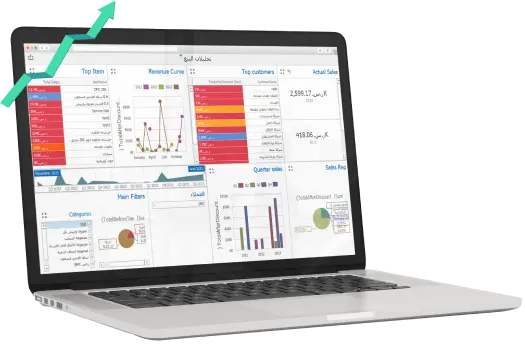There are financial rats for the customer account system such as the customer turnover rate, the average collection period, and these ratios have a role in that through which the performance of clients is evaluated and whether the level of collection from clients is appropriate for the credit period granted to clients and that there is no overstep in the credit period and also through which the period of evaluation is assessed. Credit granted to the customer, and reduced or increased
Rats can be worked out at the level of each financial period, month or quarter, semi-annually
Customer turnover = net forward sales (net credit sales) / average customer balance during the period
Average collection period = financial period / customer turnover rate
Customer turnover rate
Net credit sales / average customer balance
Average customer balance = (customer balance at the beginning of the period + customer balance at the end of the period) / 2
This rate measures how quickly clients 'accounts are turned into cash, meaning that debtors' turnover is the time it takes for one complete cycle that starts from registering debts and then collecting them to registering new debts, and therefore the completion of this accounting cycle means the speed at which debtors ’accounts turn into cash. , on the other hand, measures the rate of turnover of receivables and notes receivable effectiveness of the policies of the credit facility and customer turnover rate determines the level of investment required in the customer to maintain the established level of sales
This rate measures how quickly clients 'accounts are turned into cash, meaning that debtors' turnover is the time it takes for one complete cycle that starts from registering debts and then collecting them to registering new debts, and therefore the completion of this accounting cycle means the speed at which debtors ’accounts turn into cash. , on the other hand, measures the rate of turnover of receivables and notes receivable effectiveness of the policies of the credit facility and customer turnover rate determines the level of investment required in the customer to maintain the established level of sales
It is possible that the turnover rate of work throughout the months is high, but in the last days at the end of the year it may decrease, because the customer can make his bill with a large value and the payment for it is postponed for the new year and thus the client’s indebtedness increases at the end of the period and thus the turnover rate number is less than the previous rates remains is required for the work of the financial analysis of customer accounts at several intervals and the comparison between them and when the turnover rate in a given period is reduced must know the reason for the decline is there a weakness in the collection and there is an invoice has been working at the end of the month, for example.
Average collection period
Average collection period = financial period / customer turnover rate
The financial period is the period in which customers' accounts are evaluated if the period is a month - quarter - semi-annual - annual, which of course is in days and divides them by the customer's turnover rate
For sure, the period for the average collection period and the turnover rate is the same period in which clients' accounts are evaluated
The average collection period of usefulness is that compared with the period of the credit granted to the customer to make sure the customer pays in duration to him is Allowed Extensions for Credit
Higher average collection period a negative indicator of the weakness of the collection company and vice versa in the case of low average collection period
The average collection period is used to reduce or increase the credit period granted to him in the event that the customer adheres to the repayment period or does not comply with it
The average collection period should not be more than the credit period; otherwise there will be a delay in the collection the average collection period is related to the turnover rate - an inverse relation
The more the turnover rate increases, the average collection period decreases, which is in the interest of the company, and vice versa, if the turnover rate decreases, the average collection period increases
Financial analysis is not just a ratio. Ratios should be analyzed
The analysis takes place over a period of time monthly, quarterly, semi-annually and at the end of the year. You can also do an annual analysis
You can browse for the best banking and treasury accounting software in Egypt and the Arab world from Accflex
Customer account audit steps
Analyzing the ratios and financial indicators of clients' accounts at intervals in order to give a real indication of the quality of customer accounts, such as the customer's turnover rate and average collection periods, and compare them with similar periods throughout the year, and search and find out the causes of deviations, if any
.
Analyze sales at the month level or products and customer geographic regions
Make an analysis and compare the collections and returns discount granted to customers with previous periods or with the estimated budget
Follow-up warranty (checks - promissory note) for clients and follow up on their expiry dates
Matching the first customer balance period with the balance of the last period the previous period
Obtaining a detailed statement of customer balances and matching it with the trial balance
Review customer invoices with the price list for the month or period
Matching the supply order from the customer to review the value-added tax or the presence of the customer's tax exemption certificate and follow-up with the deduction notices deducted from the invoices (deduction and addition tax)
And review the compilation of the invoice and post it to the customer's account and the sales account at the general ledger
And follow-up authorizations out of stock with supply orders from the customer with the invoice and follow-up with the item cards
Follow-up sales returns with sales invoice with bills added to the store according to company policy in Flashback and follow-up to his deportation to the competent work accounts and sales returns
Reviewing the sequence of sales invoices and addition bills (surrogate) and in the event that the system is idle for a period, and making manual invoices to facilitate work, the manual invoices should be reviewed with the invoices written on the system to prevent any tampering that may occur
Review and follow-up advance payments clients account balances and other credit
Review a sample of large customer balances and review invoices, collections, and checks cycle received from clients
Follow up the sequence of private collection vouchers for sales representatives to prevent manipulation
Following-up on debt ages, AGING, following up on clients ’indebtedness at the level of invoices, and following up on clients’ exceeding the credit periods specified for them by the company
And following up on the credit limit of the customer with the total debt on him, and if it is exceeded, are there any approvals from the company’s management for that
Review the value of the allowance for doubtful debts - the decrease in the value of customers and that it has been accurately calculated in light of the debt and the quality of the clients' accounts and in light of the aging of the debts and the follow-up of doubtful debts by a large percentage
Matching cash receipts from clients with the movement of treasury and bank accounts
Follow-up of customer balance matches and review differences, if any (if found)
Ensure the correct evaluation of the foreign clients ’balances at the end of the financial period when preparing the financial statements and ensure that they match the exchange rate announced by the bank.
There are some basic procedures for separating duties
1- Separation of the credit function and approval of the bills for the person who makes the bills because he can hardly sell to clients who do not deserve the credit and thus increase the bad debts
2-Separating the shipping and billing function - the store keeper - from the person to do the invoices because if one person does the same, it means that tampering will take place because it is possible to get goods out of the store without making invoices. And then it is difficult to follow-up
The separation of the function of the Treasury Secretary or in charge of the collection with the function of customer accountant to prevent tampering and prevent non-registration of cash
For sure, the procedures differ from another company according to their nature NB
The receipts journal should be checked with customer accounts to ensure that the amounts collected are included in the clients' accounts







